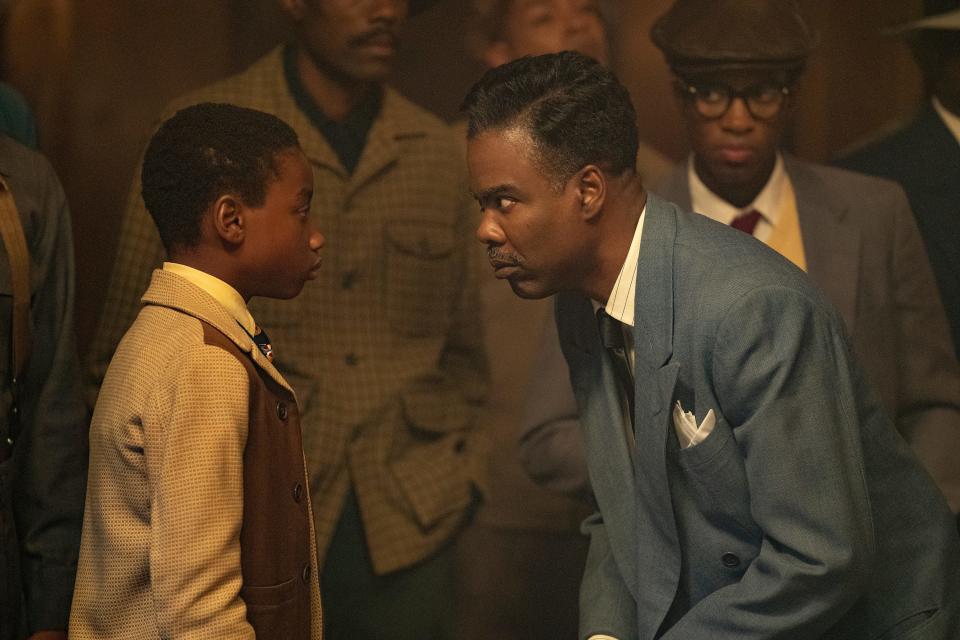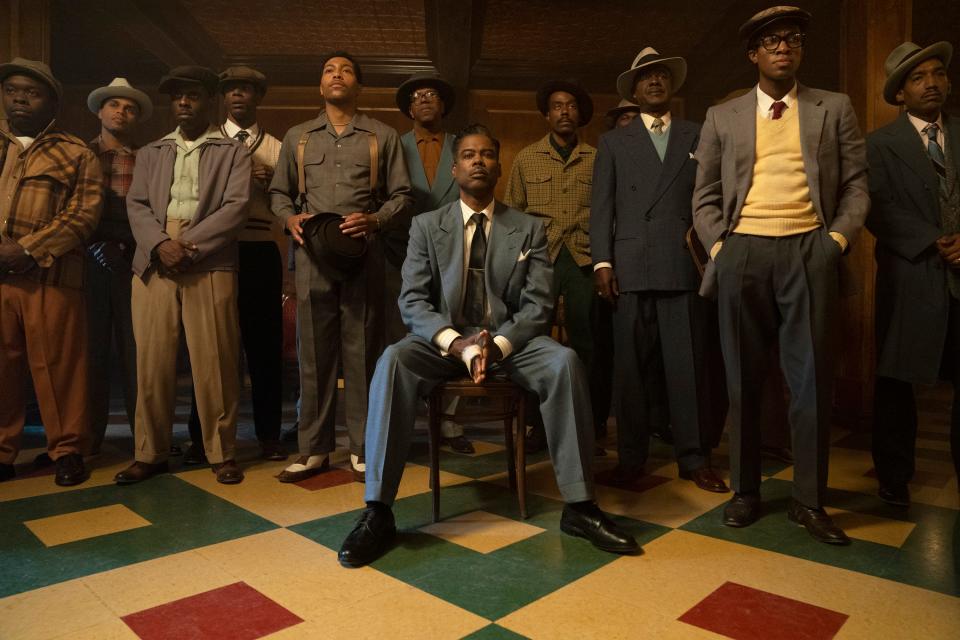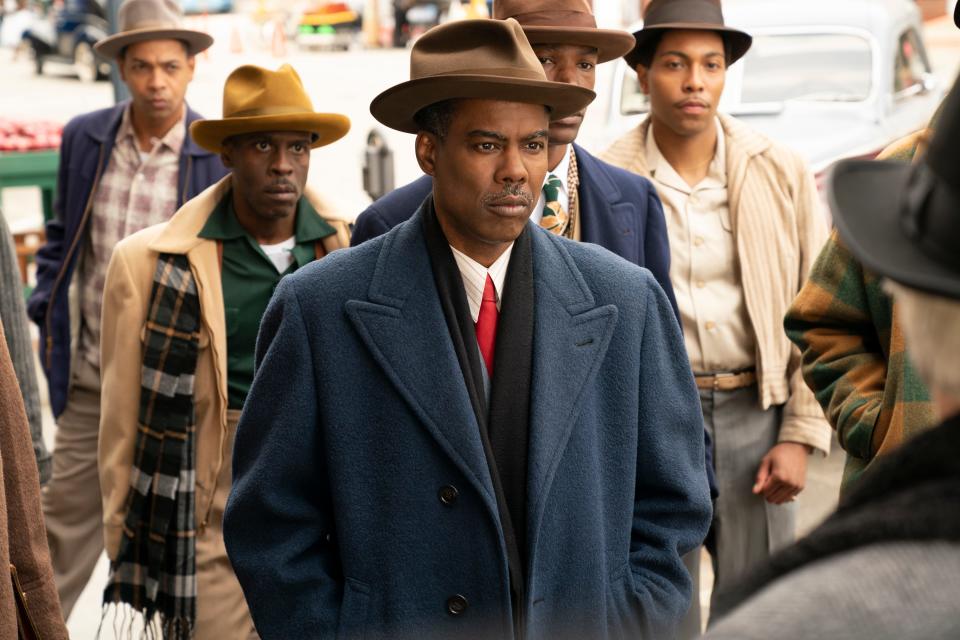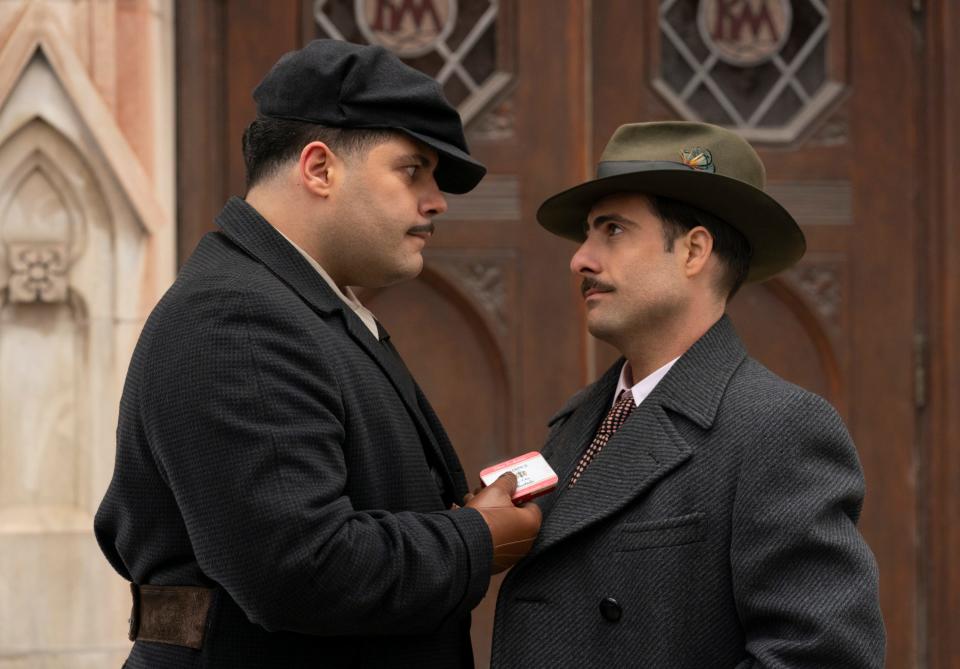'Fargo' Season 4: Chris Rock on 'playing my grandfather' as a Kansas City mob boss
"Fargo" is heading out of the snow.
FX's acclaimed limited series returns for a fourth season Sunday (9 EDT/PDT; Mondays on Hulu), its first since 2017. The latest chapter in the anthology series shifts the action back in time (to 1950) and to points below its Northern Plains roots (Kansas City, Missouri) for a timely look at the role of immigrants and warring crime bosses.
Chris Rock stars as Loy Cannon, a mob boss battling the Italians – led by Josto Fadda (Jason Schwartzman) – who, over three decades (as seen in an extended prologue), muscled out the Irish and Jews. To maintain peace, the groups trade young children, and their rivals raise them as their own.
The new season lacks a sensational murder in the opening scenes but features a narrator, Ethelrida Smutny (E’myri Crutchfield), the biracial daughter of funeral home operators, who acts as the "moral center" of the season, says creator Noah Hawley.

The series, based on Joel and Ethan Coen's Oscar-winning 1996 film, shifted production to Chicago from Calgary, Canada, but was sidelined by the coronavirus pandemic, and only shot its final episodes last month.
Our critic's take: Review: Chris Rock leads a slow-but-steady 'Fargo' Season 4
Rock, 55, and Hawley, 53, sat down with USA TODAY earlier this year to talk about the new season, how Rock effectively came to play a version of his real-life murderous grandfather, and the identity of this season's hero.
What did you want to explore going into the new season?
Noah Hawley: "Fargo" is always a story about America, on some level, and I like the idea of going back in time to look at a very seminal period in American history. I had this idea about these two families, these two criminal organizations, where they trade their youngest sons in order to keep the peace as an insurance policy. And I thought that was a really interesting dynamic. It created a lot of conflict, but it also was a way to look at assimilation and immigration and this collision that took place in northern cities.
Since the Irish family is named Milligan, was the seed of it planted with Bokeem Woodbine's Mike Milligan in Season 2, or was that just a reference point?
Hawley: It was a reference point. Bokeem had one of the great performances in the last 10 years. And I just started to think ‘Where did that guy come from?’ So some of the story is a reaction to that. Ben Whishaw plays an Irish guy who was first traded to the Hebrews and then traded to the Italians, so you have this Irish-Jewish-Italian guy who’s raising this African American kid. So it feels like that’s America at it’s best.

And Chris, you’ve been a longtime fan of the show?
Chris Rock: I was a long, long, longtime fan of the show. It was just the best show on television. "Game of Thrones," "Atlanta," "Fargo," in any particular order you want them. "Fargo" is the hardest one because it starts over; it’s a new show every freakin’ year.
So how did this come about?
Rock: He called up, he wanted a meeting, and, honestly, I didn’t even think he was calling me for "Fargo." Half of my calls, people offer me acting roles, but the other half are like, ‘Hey, can you do my kid’s bar mitzvah,’ you know? But my agent had to make me go to the meeting.

Hawley: I came up with the story; there wasn’t a script, I was making (2019 film) "Lucy in the Sky," and Chris came to the set, and I just pitched him. When I thought of this guy, I thought of Chris. Rock: I think the day I went in – show-business problems – I wasn’t nominated for an Emmy that day (for a Netflix stand-up special), and then he offers me and I’m like ‘Oh I’d much rather have this than an Emmy nom.'
You’ve done dramatic roles before, but not a lot of them, so how was that experience for you?
Rock: I mean, I like comedy that’s rooted anyway. I love Steve Martin, but I’ve never been the wild and crazy, wacky guy. I kinda like to have a real bottom to any comedy I do, anyway. The character works for me because I’m basically playing my grandfather. I was born in South Carolina, my parents were born in South Carolina, my grandparents. So this guy is kinda the same age as my grandfather. My grandfather wasn’t a mob boss, but he was a preacher, he was a public figure. My father had nine brothers, five sisters. Probably 70% (of them were) in jail, so I’ve been around that stuff a lot. I sent my mother a picture of my character with the hair and everything and she’s ready to cry. She said: ‘You look like your grandfather.’
Noah, you always come up with the best character names. Josto Fadda, Jason’s character, is obviously subject to discrimination himself but is racist. What's this season trying to say about immigration, and how relevant is it to what’s going on today?

Hawley: There’s a moment in the script where our narrator, 16-year-old Ethelrida, says ‘If America is a nation of immigrants, how does one become American?’ I think it’s just important to remember that my grandmother escaped from Russia with her family when she was 5. They had 10 kids running through the woods and made it to the boat with nine of them. They came over, moved into Brooklyn, and my grandmother slept on two kitchen chairs pulled together. Two weeks after they got there, one of the remaining nine kids was shot by a neighbor. You know, this was the American experience, and somehow they figured out a way to put a roof over their head and money in their pockets.
And the next generation was better off, and the next generation was better off after that, and we shouldn’t forget that that’s what our country is. What was exciting to me about this idea of these families that trade sons is how do you assimilate into that family? It’s not just some abstract thing; it’s a very different experience because (Cannon's) family accepts this kid into their mitts, he eats with them at the table, but in (Fadda's) family, this kid’s up in the attic; it’s very different.
How deeply does the Ethelrida storyline intersect with the mobsters'?
Hawley: It’s a really critical part of it, she’s the moral center of the show. Everyone else is kind of a criminal. And if you look at the moral spectrum of "Fargo," the movie, where you’ve got Marge and she’s all good on the one end and Peter Stormare on the other who’s evil and Bill Macy in the middle, like ‘Which way is he gonna go?’ Ethelrida is definitely the moral center. We invest in Loy, obviously, and he feels like our hero, but as Chris said, he’s a criminal and he did agree to give up his son. There’s still part of him that’s calculating in a way that isn’t moral all the time. Part of it is for the audience to have that discovery of ‘I’m rooting for this guy, but maybe I shouldn’t be rooting for this guy.’
Rock: My grandfather’s a preacher, but he also killed a man. My real grandfather. Preachers aren’t the most faithful of husbands. People that aren’t faithful, people that cheat, get really jealous. He thought my grandmother was sleeping with a guy next door and he threatened the guy – "if you take one more step in my yard, I'll blow you away" –and the guy took one more step. I was a kid, so I’m gonna say this was in the early ‘70s. I don’t know exactly what happened, but I think it was manslaughter. (He served time.)

Do you have an idea for a fifth season?
Hawley: I don’t. I didn’t have an idea for a fourth season that was three years later. What’s nice about FX is that if I say this is it, it’s it. If I call in a couple years and go ‘Well, we could do this,’ they’ll be excited to get that call.
Rock: Noah’s the Larry David of FX.
Hawley: There’s more and more programming every day. If I don’t have the delusion that this can be the best thing on TV, I don’t want to make it.
So you’re not planning anything, but you haven’t closed the door?
Hawley: Yeah, of course. I love making them. There’s nothing else that I write or make that feels like this, where you’re exploring drama and comedy and philosophy and crime. It’s so rich in so many ways. Sometimes there’s a UFO, sometimes there’s a magic bowling alley. There’s nothing else I can get away with where I can ground it but do all of that, so I love it.
What do you most like about doing the show?
Rock: Doing this show is hard, man. A lot of intricate dialogue. It’s 11 episodes, so it’s like shooting three movies at one time. It’s a real job. This is the hardest show-business job I’ve had.
Does this mean you won’t easily be convinced to do something like this again?
Rock: I mean, if somebody writes me a part like this.
This article originally appeared on USA TODAY: 'Fargo': Chris Rock on how crime-boss role echoes his own grandfather

